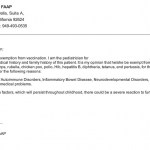california
At KCRW (an NPR member station), Karen Foshay reports on occupational injuries among low-wage restaurant workers in California and the retaliatory barriers that often keep them from speaking up. She cited a 2011 Restaurant Opportunities Center survey of Los Angeles restaurant workers that found 42 percent experienced cuts, 43 percent experienced burns and more than half reported working while sick. Foshay writes:
At a recent meeting in Azusa (in eastern Los Angeles County), several workers showed off their appointment cards for clinics like Santa Adelina. Three men lifted their pant legs to…
Here we go again.
Remember how I frequently say that naturopaths are relentless, how, whenever they attempt to get a naturopathic licensing bill passed in a state and fail, they’re soon back to try again. Basically, they keep trying until they succeed, and once they succeed, it’s game over for keeping their quackery from having the imprimatur of the state. Perhaps my favorite metaphor for this is that of the killer in a 1980s slasher flick, like Jason or Michael Myers, who frequently "dies" ta the end of one movie, only to come back the next movie to mow down another bunch of hapless teens.…
by Garrett Brown, MPH, CIH
A frequent official response to concerns that California workplace health and safety agency – Cal/OSHA or DOSH – does not have enough field enforcement compliance officers is that “California’s statistics are better that the national stats and other states.” This turns out not to be true, and cannot be used to downplay the fact that California’s Department of Industrial Relations (DIR) has not filled three dozen compliance officer vacancies at Cal/OSHA despite full funding for these positions since July 2015.
The May 13, 2016, issue of the Cal/OSHA Reporter (…
At Slate, Gabriel Thompson writes about a little-used legal provision that could go far in helping farmworkers fight wage theft and other labor abuses. A part of the Great Depression-era Fair Labor Standards Act, the statute is known as the “hot goods provision” and it gives the U.S. Department of Labor the authority block products made in violation of labor laws from being shipped across state lines.
Thompson’s story begins with Felix Vasquez, who works in the strawberry fields of Oxnard, California, and had successfully worked with legal advocates to recover owed wages from his employer,…
After writing about the failure of state medical boards to discipline physicians who practice quackery and an apparent notable exception in Tennessee just yesterday, my attention was brought back to California and the topic of SB 277, the law enacted last year that, as of July 1 this year, eliminated non-medical exemptions to school vaccine mandates. As anyone who’s read this blog for more than a year knows (or anyone who’s just paid attention to the political battle to pass SB 277 lsat year in the wake of the Disneyland measles outbreak), once the battle was over and antivaccine activists…
This weekend was the 4th of July, Independence Day. It’s the most patriotic holiday of all, at least for Americans. We celebrated it in the usual way, with parades, fireworks, the odd lost digit or two, and barbecues. Unfortunately, there’s another thing that the 4th of July inevitably brings on as well, and that’s the invocation of liberty to support dubious causes. Given what happened last year around this time in California, regular readers probably have an idea where I’m going with this. Yes, I’m referring to antivaccine activists invoking “rights” and “freedom” to justify their refusal…
Diablo Canyon Nuclear Power Plant, courtesy PG&E
The announcement that Pacific Gas and Electric (PG&E) will close the Diablo Canyon Nuclear Plant when its current operating licenses expire in 2025 has caused what can only be described as consternation mixed with occasional conniptions among the nuclear industry and some strongly pro-nuclear groups.
That’s understandable. Diablo Canyon is aging, but is not the oldest nuclear plant in the fleet and PG&E could have chosen to push for a renewal of the license to continue operations for many more years. Diablo Canyon’s two reactors…
At San Jose Mercury News, Louis Hansen reports on the “hidden” workforce of foreign workers that helped expand a Fremont plant for car manufacturer Tesla. The story begins with Gregor Lesnik, an unemployed electrician from Slovenia, who, according to his visa application, was supposed to work in South Carolina. Hansen writes:
The companies that arranged his questionable visa instead sent Lesnik to a menial job in Silicon Valley. He earned the equivalent of $5 an hour to expand the plant for one of the world’s most sophisticated companies, Tesla Motors.
Lesnik’s three-month tenure ended a year…
Hardly a day goes by lately without another story on companies like Uber and their model of classifying workers as independent contractors while treating them more like traditional employees and sidestepping traditional employer responsibilities. It’s a model that has serious implications for workers’ rights and wages. However, there’s another form of employment that may be even more damaging to hard-fought labor standards: subcontracting.
In March, the University of California-Berkely Labor Center released “Race to the Bottom: How Low-Road Subcontracting Affects Working Conditions in…
At the Milwaukee Journal Sentinel, reporter Raquel Rutledge follows up her in-depth investigation into diacetyl exposure among coffee plant workers with news that the Centers for Disease Control and Prevention is looking into the hazardous exposures that some 600,000 people face as they work to roast, grind, package and serve coffee. Rutledge reports that in the wake of newspaper’s 2015 investigation, CDC is now conducting tests at facilities across the nation — in fact, the first test results from a coffee roasting facility in Wisconsin found very high levels of chemicals that have the…
Populations around the world face many severe water challenges, from scarcity to contamination, from political or violent conflict to economic disruption. As populations and economies grow, peak water pressures on existing renewable water resources also tend to grow up to the point that natural scarcity begins to constrain the options of water planners and managers. At this point, the effects of natural fluctuations in water availability in the form of extreme weather events become even more potentially disruptive than normal. In particular, droughts begin to bite deeply into human well-being…
At Reveal, Christina Jewett investigates the gaping holes in California’s workers’ compensation system that make it so vulnerable to fraud and leave workers in the dark about the bogus care being charged in their names. She begins the article comparing the workers’ comp system to Medicare:
When Medicare makes rules, it has a strong incentive to encourage doctors, pharmacists and others to follow them: money.
The purse strings are not held nearly as tightly in California’s workers’ compensation system, in which a division of power creates the first major hurdle.
Lawmakers make rules. The state…
At Slate, Michelle Chen writes about the experiences of hotel housekeepers in Miami during spring break. The story starts with Adelle Sile, a housekeeper at the four-star Fontainebleau Miami Beach:
Around this time of year, thanks to the influx of spring break and Easter break vacationers, the time (Sile) has to clean each room during her eight-hour shift gets squeezed as guests stretch their mornings to the final minutes before checkout. When she does finally get in, she sometimes opens the door to find vomit, empty bottles, crack pipes, marijuana buds, and makeshift mattresses of cushions…
At Vox, Sarah Kliff writes about the side of medical errors we rarely hear about — the doctors and nurses who make such errors and the mental health toll of living with that responsibility. In an article that explores whether health care workers are getting the support they need to deal with such experiences, Kliff begins with the story of nurse Kim Hiatt:
Kim Hiatt had worked as a nurse for 24 years when she made her first medical error: She gave a frail infant 10 times the recommended dosage of a medication. The baby died five days later.
Hiatt's mistake was an unnecessary tragedy. But what…
Although the US still has a long way to go in preventing unintended pregnancies, an article published earlier this month in the New England Journal of Medicine had some good news: The proportion of US pregnancies that were unintended dropped from 51% in 2008 to 45% in 2011. Lawrence B. Finer and Mia R. Zolna of the Guttmacher institute analyzed data on pregnancy intention from the National Survey of Family Growth, and note that the rate of unintended pregnancy declined for every income and education group and all racial and ethnic groups. Disparities still persist -- rates are still…
Well, it's finally done.
The grants that have been taking up so much of my time are finally with the grants office and, hopefully, won't have too many errors flagged as they go through the validation process. So it's time to get back into that blogging thing again, even though I'm admittedly tired. So I'll start out slow. No Orac-ian epics today, just another rather satisfying bit of news mirroring a previous post that I did last week about how making it more difficult to obtain personal belief exemptions to school vaccine requirements works. In states where PBEs are difficult to obtain or…
At NPR, reporter Howard Berkes writes about the failure of federal laws to protect workers who are left out of the workers’ compensation system. He begins his story with Kevin Schiller, a building engineer for Macy’s department stores for more than two decades. While working in a storage room in a Macy’s in Denton, Texas, a mannequin fell from 12 feet above, hitting Schiller and forcing him to hit his head on a shelf and then the concrete floor. Berkes writes:
Schiller has hardly worked since, given persistent headaches, memory loss, disorientation and extreme sensitivity to bright light and…
(Photo: Peter Gleick 2008)
The recent severe drought in the Western United States -- and California in particular -- has shined a spotlight on a range of water-management practices that are outdated, unsustainable, or inappropriate for a modern 21st century water system. Unless these bad practices are fixed, no amount of rain will be enough to set things right. Just as bad, talking about many of these bad practices has been taboo for fear of igniting even more water conflict, but the risks of water conflicts here and around the world are already on the rise and no strategy that can reduce…
At the Minneapolis Star Tribune, reporter Jeffrey Meitrodt authored an outstanding four-part series on one of the nation’s deadliest occupations: farm work. In “Tragic Harvest,” Meitrodt chronicles the impact of lax farmworker safety rules and the rise in worker fatalities in Minnesota. He begins his series with the story of farmworker Richard Rosetter:
Richard Rosetter stood inside his 28-foot grain bin and smashed a shovel into the thick layer of ice that covered his corn.
He was in a foul mood. His wife and a neighbor were pestering him, upset that he was working by himself, with no…
When last I discussed the cruel sham that is the tide of "right-to-try" laws that has been flowing through state legislatures to become law over the last year and a half. "Right-to-try" laws, as I pointed out when I first noted the earliest ones being promoted in Colorado, Louisiana, Arizona, and Missouri, referring to them as Dallas Buyers Club bills based on their seeming inspiration from that movie and pointing out how they are very, very bad policy that, contrary to the claims of its proponents, are far more likely to harm patients than help them. In every state in which such bills have…



